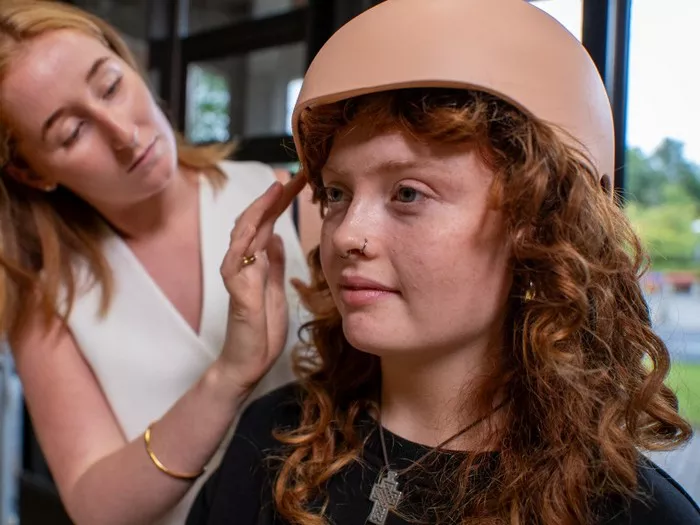A wearable scalp-cooling helmet designed to help cancer patients prevent hair loss during chemotherapy, alongside an innovative weather sensor inspired by a maple seed, have been named the global winners of the 2024 James Dyson Award.
The Athena helmet claimed this year’s prestigious Medical award, while the AirXeed Radiosonde was honored with the Sustainability award. Each project will receive £30,000 in funding to support ongoing research and development.
Developed by Olivia Humphreys, a graduate of the University of Limerick, the Athena helmet aims to alleviate one of the most distressing side effects of chemotherapy: hair loss. Humphreys, who was inspired by her mother’s battle with cancer, created the device to provide a more accessible, patient-friendly solution for scalp cooling.
The battery-powered helmet uses a thermal control module to cool a small, portable water reservoir, circulating it around the scalp via soft tubing inside the headpiece. This design offers a flexible, patient-controlled solution that can be used outside of medical facilities, reducing the time cancer patients spend in hospitals.
Humphreys highlighted the affordability of Athena, noting that it costs just a fraction of the price of existing scalp-cooling treatments, making it a more accessible option for chemotherapy patients. “Athena’s goal is to make scalp-cooling therapy – currently a limited and costly treatment – more accessible to cancer patients to help minimize hair loss,” she said.
With its compact and battery-powered design, Athena allows patients to use it at home or during their commutes, providing greater convenience and autonomy throughout their treatment.
On the sustainability front, the AirXeed Radiosonde, created by Shane Kyi Hla Win and Danial Sufiyan Bin Shaiful of the Singapore University of Technology and Design, offers a revolutionary alternative to the single-use weather sensors traditionally attached to weather balloons.
Modeled on the natural autorotation of maple seeds, the AirXeed radiosonde features an asymmetrical shape that allows it to spin as it falls, collecting and transmitting atmospheric data more efficiently than conventional sensors. The device’s unique design ensures a controlled descent, minimizing the risk of damage upon landing and increasing the likelihood of it landing in accessible locations, promoting its reuse.
“We designed the AirXeed radiosonde to feature an autorotating glider with a large, controllable flap, allowing directional control similar to a helicopter rotor,” said Win and Shaiful. “This innovative flap enables the device to alternate between gliding and rapid descent, ensuring precise landing in target collection zones.”
The engineers plan to conduct real-world trials to refine the product further, with the aim of establishing AirXeed as a new standard in the weather industry.
The James Dyson Award, which celebrates the best inventions by student and graduate designers, has previously recognized groundbreaking innovations, including a hands-free IV device for disaster zones and an infection-sensing wound dressing.
Related topics:
- Actress Sheila Sim Undergoes Hair Transplant to Address Bald Spot
- The Surge in Celebrity Hair Transplants: A Boost to Confidence and Marketability
- Dyson Unveils Special-Edition Hair Care Range with Exclusive Gifts for the Holidays


